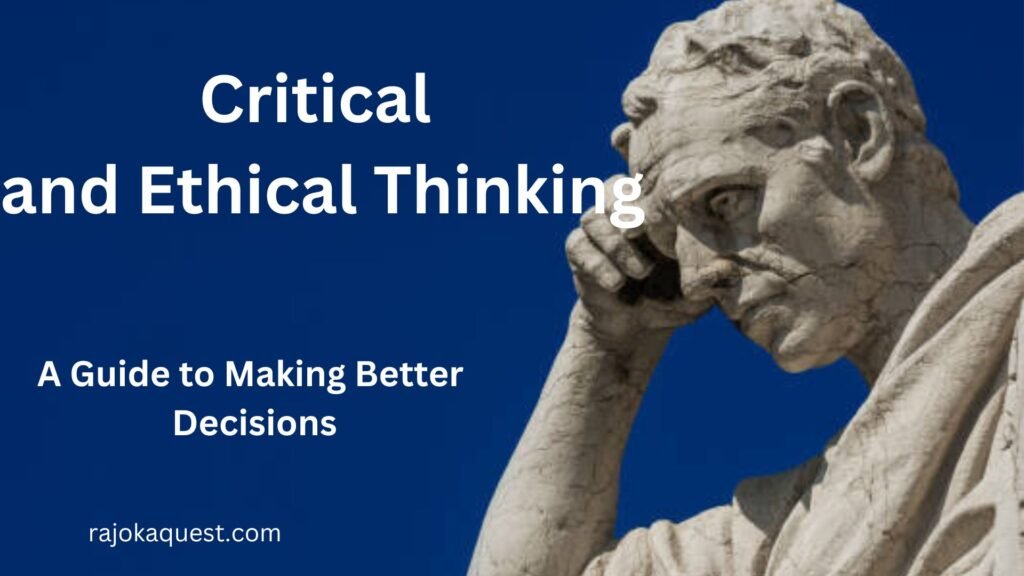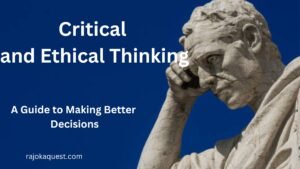Critical and Ethical Thinking: A Guide to Making Better Decisions

Critical and Ethical Thinking
Critical and Ethical Thinking: A Guide to Making Better Decisions
The capacity to think critically and ethically has never been more crucial in a world becoming increasingly interconnected and complex. To make informed and responsible decisions, it is imperative to incorporate critical and ethical thinking into one’s approach, regardless of whether one faces personal decisions, professional challenges, or societal issues.
This article will investigate the connection between critical and ethical thinking, their importance in the present day, and how they can be implemented in various human endeavors. A well-rounded and thoughtful approach to problem-solving can be achieved by comprehending the ability to evaluate situations while critically contemplating ethical implications.
What is critical thinking?
Critical thinking is the capacity to logically and reasonably analyze, evaluate, and interpret information. To arrive at well-informed conclusions, one must query assumptions, identify biases, and consider multiple perspectives.
Critical thinking is fundamentally about maintaining an attitude of skepticism and curiosity without becoming cynical. Critical thinkers do not accept information at face value; they seek evidence, challenge the status quo, and make decisions based on reason rather than emotion or habit.
For instance, when presented with a news article, a critical thinker will assess the source, verify the facts, and contemplate alternative perspectives before formulating an opinion. They may pose inquiries such as: Is this information trustworthy? Are there any prejudices at play? What are the other perspectives on this matter?
What is the definition of Ethical thinking?
Ethical thinking is centered on fairness and morality, whereas critical thinking concentrates on logic, analysis, and evaluation. Ethical reasoning entails evaluating whether an action or decision is consistent with moral principles, including integrity, honesty, and justice.
Ethical thinkers evaluate the implications of their actions and decisions on society and others. They contemplate whether their decisions advance the common interest, respect, and fairness. Ethical reasoning frequently entails assessing conflicting interests and determining the most plausible course of action on moral principles.
For example, ethical reasoning may motivate an organization to evaluate the consequences of its operations on its customers, employees, and the environment rather than exclusively emphasizing profitability.
The Intersection of Critical and Ethical Thinking
The interdependence of critical and ethical thinking is profound. Ethical thinking guarantees that decisions are morally sound and responsible, whereas critical thinking assists individuals in analyzing and evaluating situations. The following is an explanation of the nature of the complementarity between these two thought processes:
- Assessing the Bigger Picture: Critical thinking assists in collecting and evaluating information, while ethical thinking guarantees that we consider the broader implications of our decisions. For instance, critical thinking may entail examining market demand and competitor products when developing a new product. The product’s environmental impact, consumer safety, and the equity of labor practices involved in its production would all be considered in ethical thinking.
- Challenging Assumptions: Challenging assumptions is essential for both critical and ethical reasoning. Critical thinkers query the validity or bias of the information they receive, while ethical thinkers question the fairness and justice of their decisions, even if they adhere to societal norms.
- Avoiding Cognitive Biases: Personal biases and emotive responses can obscure ethical decision-making. Critical thinking enables individuals to identify these biases, facilitating more ethical and objective decision-making. For example, a leader who prioritizes certain team members over others may make unethical decisions due to unconscious bias. Critical thinking is instrumental in identifying and correcting these biases, thereby fostering equity.
- Balancing Conflicting Interests: Life frequently presents circumstances requiring us to balance competing interests. Ethical thinking assists us in making decisions that adhere to principles such as honesty, fairness, and respect for others. In contrast, critical thinking helps us evaluate the advantages and disadvantages of various alternatives.
Why Critical and Ethical Thinking Matter in the Modern World
In the current fast-paced, information-rich environment, critical and ethical thinking are indispensable skills for personal, professional, and societal development. These talents are more critical than ever for the following reasons:
1. Handling Misinformation
Misinformation is Misinformation the proliferation of online news and social media. Using critical thinking, individuals can navigate the vast ocean of information by evaluating the credibility of claims, interrogating sources, and distinguishing between fact and opinion. When individuals lack critical thinking, they are more susceptible to accepting inaccurate information or succumbing to deceptive narratives.
Concurrently, ethical reasoning influences our interaction with data. The dissemination of inaccurate or misleading information can result in severe repercussions, including reinforcing harmful stereotypes, spreading hysteria, and controlling individuals’ decisions in detrimental ways. Ethical thinkers are conscientious of the information they disseminate and endeavor to advance truth and equity in communication.
2. Making Informed and Responsible Decisions
Individuals and organizations make daily decisions that affect society, others, and themselves. Critical and ethical thinking is imperative to guarantee that these decisions are well-informed and reflect their broader implications.
For instance, a business that prioritizes critical and ethical thinking may inquire about the long-term environmental consequences of its operations and pursue sustainable alternatives. Individuals who think critically and ethically are more inclined to make decisions consistent with their values, even when confronted with challenging options.
3. Promoting Justice and Equity
Society is replete with ethical quandaries that necessitate thoughtful reflection and deliberation. Critical and ethical thinking is indispensable for advancing justice and equity, regardless of whether the issue is environmental degradation, corporate accountability, or inequality.
Ethical thinkers consider the rights and requirements of all stakeholders, not just those who directly benefit from a decision. In contrast, critical thinkers assist in identifying potential biases or faults in arguments that could result in unjust outcomes. These abilities collectively facilitate the development of more equitable solutions for individuals and institutions.
4. Building Stronger Relationships
Critical and ethical thinking fosters improved communication, comprehension, and trust in personal and professional relationships. Critical thinking enables individuals to listen attentively, consider alternative viewpoints, and rationally assess arguments. Ethical thinking guarantees that decisions and actions are honest, respectful, and considerate of the welfare of others.
For instance, ethical reasoning cultivates an atmosphere of workplace equity, inclusivity, and respect. Leaders who prioritize ethical and critical thinking are more inclined to make decisions that benefit the organization, employees, customers, and the community.
Methods for the Practical Development of Critical and Ethical Thinking
These abilities can be developed and enhanced through practice, even though some individuals may naturally possess critical, solid, and ethical reasoning skills. The following are some practical strategies for improving these abilities:
1. Question Everything
Questioning Everything is one of the most critical components of critical reasoning. Ask yourself: Is this accurate, regardless of whether it is a news headline, a friend’s opinion, or a company policy? What evidence is consistent with this assertion? What exists as alternativeEverythingves?
By calling everything information you encounter, you will cultivate a more complex comprehension of the subject matter and be less inclined to accept it at face value.
2. Consider the Consequences
Ethical thinking necessitates considering the repercussions of our actions, not only for ourselves but also for others. When confronted with a decision, consider the impact on those in your immediate vicinity. What are the potential consequences of this decision in the long term? Is this decision consistent with my principles?
Consider the repercussions of your actions, and you will be more inclined to make ethical decisions that foster respect and impartiality.
3. Reflect on Personal Biases
Acknowledging our biases and limitations is a prerequisite for critical and ethical thinking. Whether we dismiss opposing opinions, favor specific viewpoints, or rely on sentiment rather than logic to inform our decisions, we all possess unconscious biases that affect our thinking.
Spend some time contemplating your biases and how they may affect your decision-making. By acknowledging these biases, you can strive to surmount them and make more ethical and objective decisions.
4. Engage in Ethical Discussions
Engaging in discussions regarding ethical matters is one of the most effective methods for cultivating ethical reasoning. Discussing ethical dilemmas in a classroom, at work, or with friends and family enhances one’s capacity to think critically about moral questions.
Challenge your preconceived notions and evaluate alternative perspectives during these discussions. This process will assist you in developing a more comprehensive and deliberate approach to ethical decision-making.
5. Practice empathy
Empathy, or the capacity to comprehend and reciprocate the emotions of others, is an indispensable element of ethical reasoning. When confronted with a decision, it is essential to consider the potential impact on others, particularly those who may not have a voice in the conversation. By engaging in empathy, you can ensure that your decisions are equitable, just, and respectful of all stakeholders.
Conclusion
Critical and ethical thinking is indispensable to formulating morally sound, responsible, and well-informed decisions in personal and professional contexts. Critical thinking assists in assessing information, questioning assumptions, and preventing fallacies, while ethical thinking guarantees that our decisions are founded on justice, fairness, and respect.
Incorporating these two abilities into your decision-making process allows you to navigate intricate situations more effectively and confidently. Critical and ethical thinking establishes a solid foundation for responsible and deliberate action, regardless of whether you address societal issues, relationships, or your career.
The capacity to think critically and ethically is a valuable skill and a necessity in a world where Misinformation is prevalent, and there are numerous misimisinformation honing these skills, you will be better at preparMisinformationisions that misinform society, others, and yourself.
Read more, Click Here.



